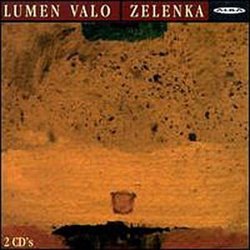| All Artists: Jan Dismas Zelenka Title: Lumen Valo: Zelenka Members Wishing: 1 Total Copies: 0 Label: Alba Release Date: 10/24/2000 Genre: Classical Styles: Opera & Classical Vocal, Historical Periods, Baroque (c.1600-1750), Early Music Number of Discs: 2 SwapaCD Credits: 2 UPCs: 617513120141, 6417513120141 |
Search - Jan Dismas Zelenka :: Lumen Valo: Zelenka
 | Jan Dismas Zelenka Lumen Valo: Zelenka Genre: Classical
|
Larger Image |
CD Details |
CD ReviewsResponsoria pro Hebdomada Sancta ... Giordano Bruno | Wherever I am, I am. | 05/13/2009 (5 out of 5 stars) "... the Responsories for the matins liturgy for Thursday, Friday, and Saturday of Holy Week. That's what you'll hear on this CD, though you'd never guess from the cover. "Lumen Valo" is (or was) the name of a Finnish vocal ensemble - eight singers plus organ and cello - and this seems to be their only available recording. [Don't worry, friends; I won't call it "eponymous" unless I discover that Lumen was a character in the Kalevala.] Since this recording was made in 1999, I'm a little insecure about the ensemble's survival. It would be a shame not to hear more from them; this performance was on a par with the best.
Most of the great 'Tenebrae' compositions of the baroque era are settings of the texts from the Lamentations of Jeremiah, with three lessons for each matins service to be sung in shadows until the chapel is sunk in complete darkness. These responsories are settings of texts from the Psalms and the Gospels, with non-scriptural tropes dating from the 4th C. Such responsories had earlier been sung in plainchant but started to receive polyphonic settings in the 16th C. To sing all 27 of these short compositions as a continuous program is utterly 'inauthentic', but Lumen Valo sings them with such lovely intensity that their musical unity brushes such doubts aside. Jan Dismas Zelenka (1679-1745) wrote the Responsoria very early in his career as 'court church composer' in Dresden, and they were performed there in 1723. The bulk of his instrumental music, including his wonderful trio sonatas, had been written before Dresden, and nearly all of his later compositions were to be sacred vocal music. Prior to 1723, Zelenka had taken leave from Dresden to study with Fux in Vienna and Lotti in Venice. Curiously, he seems to have studied principally 'prima prattica' polyphony, and he collected a significant library of manuscripts of manuscripts of the older composers, including Palestrina, Lassus, and Morales. The Responsonia were written in imitation of that older style of equal-voice polyphony, with its sublimely meditative nature, and they sound a lot more like Lassus than like Hasse or Bach. Lumen Valo has emphasized that antique spirituality by singing the responsories with only simple continuo from the organ and cello, even though the Dresden archives show that the original performance included doubling by brass and strings. Since the role of the responsories in the Tenebrae liturgy was to allow quiet reflection on the Lesson, the choice seems valid. In any case, these pieces are full of moody shadows, deeply sincere in their penitential fervor, as 'meditative' as any music could be. Zelenka was possibly the most independent and original composer of the Baroque, alongside J.S. Bach in his subtle complexity. This performance presents a thoroughly different aspect of his genius, his ability to abandon all the fashionable mannerisms of his era and to compose timelessly." |

 Track Listings (12) - Disc #1
Track Listings (12) - Disc #1